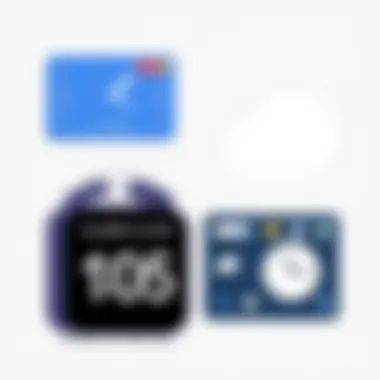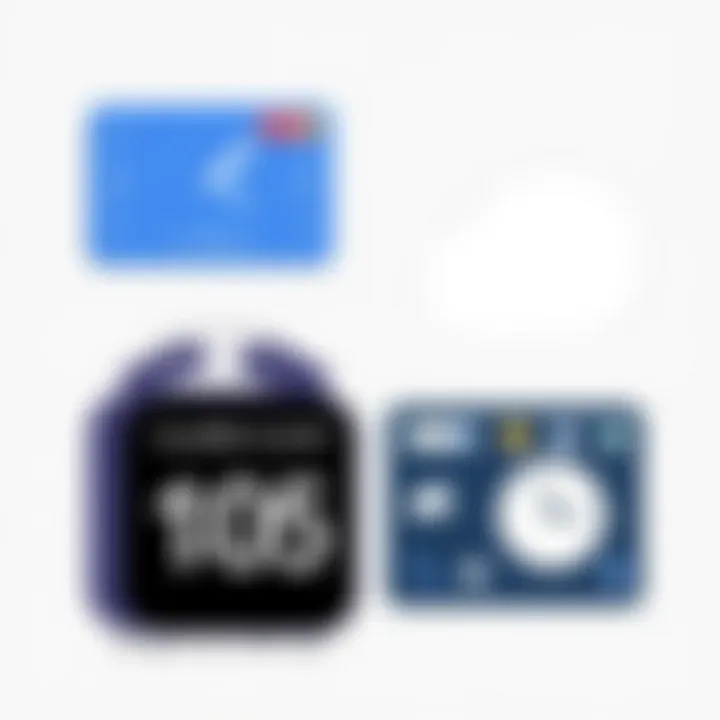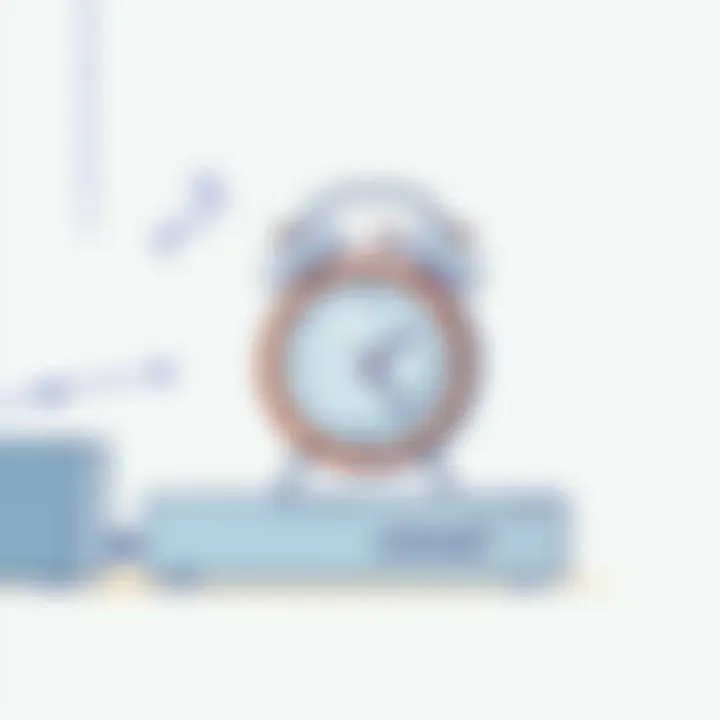Top Alarm Clock Apps for Those Who Love to Snooze


Intro
Waking up in the morning can often feel like climbing a mountain, especially for those who have a penchant for hitting the snooze button. Alarm clocks have evolved since the days of jarring sounds and analog dials, with apps now providing a plethora of features tailored for those who dare to snooze. In this guide, we will explore the world of alarm clock applications, focusing on what makes them particularly suitable for individuals prone to the snooze temptation. The discussion aims to highlight crucial functionalities, usability insights, and performance evaluations, weaving a comprehensive tapestry of what to expect from these digital companions.
As technology continues to integrate more deeply into our lives, the intersection of sleep science and app development has birthed innovative solutions. From customizable sounds that peak your interest to gentle waking methods that mimic natural sunlight, the right alarm app can transform the morning struggle into a more pleasant experience. This overview lays the groundwork for illuminating the best available options, ensuring that readers leave with a clear understanding of how various features cater to their snoozing habits.
Understanding the typical challenges faced by habitual snoozers is integral in selecting the right app. This article aims to empower users with the insight needed to navigate through the myriad of choices and pinpoint the ideal app tailored to their unique lifestyle needs and sleeping patterns.
Let's dive into the specifics.
Prolusion to Alarm Clock Apps
Alarm clock apps have become an essential tool in our daily lives, especially for those who struggle to get out of bed on time. In a world where the pace of life is relentless and the demands of work, school, and social engagements push us to our limits, the reliability of a simple alarm to usher us into the day is paramount. These digital clock devices we now rely upon do much more than simply wake us up; they form the backbone of our morning routines and impact our overall productivity.
As people increasingly turn to smartphones for everyday tasks, the shift from traditional alarm clocks to apps has been quick and widespread. It's not just about blaring sounds or snooze buttons anymore. Today's alarm clock apps come packed with features that cater to individual needs and habits. For someone prone to hitting snooze repeatedly, these apps offer specialized functionalities that work around sleep patterns and wake-up tendencies. Having effective alarm solutions is, therefore, a game-changer for many.
The Need for Effective Alarm Solutions
The quest for effective alarm solutions might just stem from a common thread shared among many: sleepiness. Whether it's battling fatigue from a long day or adjusting to a disrupted sleep cycle, the morning can feel like a Everest to climb. With the ubiquity of screens and distractions, waking up can be a challenge fit for a gladiator. Thus, an effective alarm clock app becomes more than a convenience; it's an ally in navigating the struggle of early mornings.
Various solutions exist tailored for the chronic snoozer. Some apps incentivize users to rise promptly, while others help identify sleep cycles and adapt to the natural wake-up rhythm of the user. It’s like having a personal coach urging you on to embrace the day. The implications of such technologies stretch far beyond just the morning; they can seriously affect productivity, mood, and even physical health throughout the day.
Understanding the Snooze Habit
Many people, if not most, can relate to the guilt of smashing that snooze button at 6 AM, hoping to squeeze in 'just five more minutes' of sleep. The snooze habit layers itself onto the waking process, creating a routine that can be as difficult to break as it is mindless. But why do we hit 'snooze'? Psychology plays a part here, along with our body's natural inclination to stay cozy and comfortable.
When that alarm blares, it’s an immediate clash of body and mind. On one hand, there's the longing for more sleep, while on the other, the knowledge of responsibilities looms over us like a dark cloud. Understanding this battle provides insight into why effective alarm solutions are vital.
Research indicates that the more someone presses snooze, the less likely they are to wake feeling refreshed. Each time an individual returns to slumber, they ease back into a sleep cycle that can disrupt the waking process. Not every alarm clock app caters to the heavy snoozer, but those designed with specific features aim to break this cyclic snooze behavior. Many offer a gentle wake-up process or playful challenges that demand full consciousness to shut the alarm off, nudging users towards getting up instead of falling back into the mattress abyss. It’s all about making mornings less of a struggle and more of a solution.
Key Features of Alarm Clock Apps
In our fast-paced world, finding reliable ways to wake up can be a challenge, especially for those who hit the snooze button more than they'd like to admit. Key features in alarm clock apps play a pivotal role in shaping one’s morning routine. A well-designed alarm app does more than just beep at your desired time; it enhances your ability to rise and shine without unnecessary struggle. Let's delve into some of the primary elements that these apps offer, focusing on how they cater specifically to habitual snoozers and enhance the waking experience.
Customizable Alarm Settings
When it comes to alarm clock apps, flexibility is key. Customizable alarm settings allow users to tailor their waking experience to fit their preferences. You might want a gentle transition from sleep to wakefulness, or perhaps you'd rather be jolted awake by a thumping tune. Different apps offer varying degrees of customization, such as:
- Choosing Alarm Sounds: Many apps let you select from a plethora of tones, from serene nature sounds to upbeat music. This helps ease the transition into wakefulness.
- Vibration Settings: For those who are heavy sleepers, adjustable vibration patterns can effectively complement sound alerts.
- Volume Control: Some users prefer a gradual increase in volume, while others may set a fixed loud level.
These features ensure that users can customize their alarms based on what is most effective for them, making it less likely that they’ll miss the wake-up call entirely. Having such options can make waking up less of a chore and more of a personalized experience.
Snooze Functionality
Snoozing is a common practice, often seen as a double-edged sword. The snooze button can be a lifeline for some, offering just a few more minutes of precious sleep. Consequently, snooze functionality is a critical component in alarm apps aimed at habitual snoozers. Key aspects to consider include:
- Snooze Duration Settings: Users should be able to set their preferred snooze length. Some might opt for the standard 5-minute increment, while others may prefer 10 or even longer.
- Multiple Snooze Options: Rather than a single snooze button, some apps allow setting multiple alarms with different snooze durations. This provides a layered approach to waking up.
- Limit on Snoozes: Certain apps incorporate a limit to how many times one can hit the snooze button, effectively encouraging users to get out of bed without the constant temptation to keep delaying.
A thoughtful implementation of snooze functionality can motivate users to break the cycle of snoozing and ultimately improve their waking habits. \n
User Interface and Experience
Finally, the user interface (UI) and overall user experience (UX) of an alarm clock app can make or break its effectiveness. An intuitive design can encourage retention and daily use, whereas a cluttered or complicated interface might lead to frustration. Here are aspects to pay attention to:


- Simplicity: The best alarm apps offer a straightforward layout that allows users to set alarms with minimal effort. Major buttons should be easily identifiable.
- Visual Appeal: Engaging visuals can enhance the user experience. Balanced color schemes and comforting themes create a pleasant waking experience.
- Accessibility Features: It's important for alarm apps to cater to diverse users. Features like voice commands, high-contrast text, and larger buttons can benefit people with disabilities or those who may struggle with fine motor skills.
An engaging user interface, combined with thoughtful UX elements, encourages consistent use and maximizes the alarm app’s effectiveness in helping users wake up on time.
"A great alarm clock app is not just about the sound; it’s about the experience of waking up."
Top Alarm Clock Apps for Snoozers
When it comes to rising from the comfort of your warm bed, alarm clock apps can be a game changer for those who struggle with the snooze button. These apps are not just simple timers; they cater to a unique subset of needs focusing on habitual snoozers. In this section, we will explore various applications that can redefine how you wake up each day, emphasizing features that help you shake off sleep inertia and get your day rolling. With the right app, the routine of daily waking can transform from a groggy ordeal into a dynamic jumpstart to your day.
App One: Features and Benefits
One standout app for snoozers is Alarmy. Often dubbed the "most annoying alarm app ever," it has features designed explicitly to mitigate repeated snoozing. When the alarm blares, you can only silence it by completing a task. This could be a math problem, taking a picture of a registered location, or even shaking the phone vigorously. The idea is straightforward: make the act of turning off the alarm more engaging than just a simple tap.
Benefits:
- Engagement over Indifference: By requiring interaction, Alarmy ensures that users are awake enough to engage with their morning.
- Task Variety: Choosing different types of tasks keeps the experience fresh, avoiding boredom that comes with doing the same action each day.
- Custom Tones and Settings: You can select or upload unique sounds, making your wake-up experience more personally catered.
App Two: Features and Benefits
Another app worth considering is Sleep Cycle. Unlike typical alarm apps, this one acts as a sleep tracker first and an alarm second. It monitors your sleep patterns and wakes you during your lightest sleep phase within a set time window close to your designated wake-up time. This makes the waking experience feel more natural and less jarring.
Benefits:
- Intelligent Waking: By analyzing sleep cycles, it allows for waking up during a phase when you're less groggy, enhancing your mornings.
- Comprehensive Sleep Insights: Offers analytics on how well you are sleeping, which can be beneficial for those looking to improve their sleep habits.
- Snooze Management: It's less about rejecting the alarm and more about waking up when you’re naturally ready, reducing the urge to snooze.
App Three: Features and Benefits
Lastly, we cannot overlook I Can't Wake Up!. This app has various alarm challenges aimed squarely at those who can't resist hitting that snooze button. Its multiple tasks ensure that you actively get out of bed to turn it off.
Benefits:
- Variety of Tasks: From math puzzles to brain teasers, it offers over a dozen different ways to silence your alarm.
- Customization: Users can pick tasks based on their preferences and mood, creating a personalized wake-up ritual.
- Motivation Features: It can also track how often you wake up on time, providing insights that can motivate you to improve.
Each of these apps provides something a bit different for users grappling with the snooze habit. Finding the right fit can mean the difference between dreading waking up and flipping the covers in anticipation of a productive day.
Comparative Analysis of the Best Apps
The landscape of alarm clock applications can be a bit like a mixed bag of jellybeans; there is a wide variety to choose from, and not all of them hit the sweet spot. When it comes to selecting the right app, a comparative analysis plays a pivotal role. This part of the article zeroes in on key aspects of different alarm clock apps, helping you understand their strengths and weaknesses, which can significantly impact your mornings. By examining various features, user experiences, and performance metrics, readers can cut through marketing fluff and focus on what really matters.
When looking at alarm clock apps, comparing features like customizable settings, usability, and the ease of the snooze function can make the difference between a peaceful wake-up and a groggy stumble out of bed. These comparisons allow snoozers to find an app that doesn't just sound off at the appropriate time, but also encourages an effective start to the day.
Performance Metrics
Analyzing the performance metrics of alarm clock apps goes beyond just checking whether they ring at the expected minute. It's about measuring how effectively they wake users up. These metrics cover elements such as reliability of the alarm function, battery consumption, and responsiveness of the app interface during use.
For example:
- Alarm Reliability: Does the app consistently wake you up at the set time?
- Battery Usage: How much power does the app drain from your device, especially when active during the night?
- Compatibility: Is the app versatile enough to work seamlessly across various devices?
A user might appreciate an app like Sleep Cycle for its ability to wake them during light sleep, while another user might prefer something straightforward like Alarmy that ensures they get out of bed by requiring unique tasks to deactivate the alarm.
Many users turn to online forums and review sections for real-world performance assessments, and these insights can be invaluable in guiding their choice.
User Feedback and Ratings


When it comes to choosing the best alarm clock app, user feedback and ratings act as a beacon for new users. They provide a glimpse into the experiences of individuals who have navigated the rocky terrain of snoozing their alarms.
User feedback often includes details on:
- Ease of Use: Is the app intuitive enough for non-tech savvy individuals?
- Useful Features: What do users think about features like customizable snooze times or varied alarm tones?
- Technical Issues: Are complaints about bugs or crashes common among reviewers?
Learning from the experiences of others is crucial, especially in a niche where clientele prioritizes functionality and ease of use. On platforms like Reddit, users frequently share their candid thoughts, allowing for a deeper understanding of how specific apps perform in everyday scenarios. The cumulative ratings—the likes and the disappointments—paint a clearer picture for potential users.
In summary, engaging in a thorough comparative analysis not only equips snoozers with the right information but also opens up the possibilities of enhancing their waking experience. Taking the time to understand performance metrics alongside user feedback ensures that morning alarms can transition from being an unwanted nuisance to a respectful nudging towards a more productive day.
Choosing the Right Alarm Clock App
Choosing the right alarm clock app is not just about setting a time to wake up; it’s about aligning the app’s functionality with your personal habits and lifestyle. With an array of options available, each designed to cater to different preferences and needs, the challenge lies in digging deeper to find which features resonate most with your snoozing tendencies.
The right app can transform your mornings from chaotic to manageable, gently nudging you awake in a way that feels natural rather than jarring. By identifying what you specifically need from an alarm clock app, you not only enhance your chances of waking up on time but also improve your overall sleep hygiene. Whether it’s through soothing sounds, engaging wake-up tasks, or advanced snooze settings, determining these personal requirements forms the foundation of choosing an effective solution.
Identifying Personal Needs
The journey begins with understanding your own habits and preferences. Are you someone who drifts off with the lull of soft melodies or do you require something more jarring to peel yourself from the sheets? Taking stock of how you generally wake up can help refine your choices.
Here are some points to consider:
- Waking Style: Do you prefer gradual wake-up features, like increasing volume of sound, or immediate awakening?
- Customization: Look for apps that allow you to change tones or even integrate your favorite songs as alarms.
- Snooze Duration: Determine what snooze time fits your rhythm of waking. Some prefer short, while others benefit from more extended snooze intervals.
- Reminders and Notifications: If you need push alerts for mindfulness or tasks post-wakeup, check for apps that include these features.
Understanding your sleeping patterns is crucial. If you tend to mentally hit the snooze button too often, look for apps with motivational prompts or clever wake-up challenges that might get your blood pumping.
Trial and Usage Considerations
Once you’ve identified your needs, it’s time to put the shortlisted apps to the test. Many alarm clock applications offer free trials or basic versions that let you explore their functionalities before committing financially.
Here’s how to go about it:
- Test Drive: Install a few apps that intrigue you, experiment with settings, and observe what feels right.
- Daily Usage: Stick to one app for a week, if possible. Note how easily it fits within your routine.
- Monitor Notifications: Be mindful of how the app informs you about upcoming alarms or any necessary adjustments.
- Customization Options: How intuitive is it to change settings? If it feels cumbersome, it might not be the right fit.
- Feedback Mechanism: Consider using platforms like Reddit to see how users with similar sleep challenges view the app you’re testing. Such insights can offer valuable context beyond the app description.
Choosing the right alarm clock app is like finding the right pair of shoes – they should fit comfortably and meet your unique needs while supporting your daily journey towards better waking habits. Prioritize personal needs and trial experiences. This thoughtful approach allows you to become a master of your morning, ensuring you start each day with purpose and energy.
"Choosing the right tools for waking up can set the tone for success. Take the time to find what blends seamlessly into your lifestyle."
For more insights on sleep and technology, check out resources like SleepFoundation.org, CDC.gov, and Harvard Health.
In sum, enabling yourself with the right alarm clock app is crucial in crafting a productive morning routine, setting the stage for a successful day.
Tips for Enhancing Alarm Effectiveness
When it comes to alarm clock apps, simply having a blaring sound or a gentle chime isn’t enough to cut it anymore. People are no longer satisfied with a one-size-fits-all approach to waking up; they require something more tailored to their increasingly complex lives. Integrating effective alarm strategies significantly transforms morning routines, especially for those who can’t kick the snooze button habit. Here, we explore some pragmatic tips that can elevate the overall effectiveness of alarm applications in your daily grind.
Establishing a Consistent Sleep Schedule
One of the linchpins of waking up effectively revolves around establishing a consistent sleep schedule. It’s a straightforward idea, yet its implementation can seem like climbing Everest for many.
Benefits of a Regular Sleep Schedule:
- Enhanced Sleep Quality: By going to bed and rising at the same time every day, you help regulate your body’s internal clock, leading to better sleep quality.
- Improved Alertness: Ongoing consistency can lead to more natural waking, reducing the grogginess that hits when the body’s used to a different rhythm.
- Easier Alarm Management: When your body is in sync, the audible signals from your alarm app become more effective. You’re not just waking up from deep sleep but rather surfacing from lighter stages.


This isn’t about setting your phone down in despair when the morning light filters through your curtains; it’s about forming habits that make waking up feel less like a battle. Gradually adjusting your sleep schedule—whether that means going to bed earlier or waking up a tad later—is a step worth considering.
"Your body has a way of adapting; it just needs a little lead time to adjust to a new routine."
Environmental Factors to Consider
The environment in which you sleep can significantly impact how effective an alarm app may be. Creating a conducive sleep space isn’t just a luxury; it’s a necessity.
Key Environmental Considerations:
- Lighting: Darkness encourages melatonin production, which makes it easier to drift off. Ensure your space is dark enough when sleeping and bright enough when waking.
- Noise Levels: Limit disruptive sounds. Consider investing in white noise machines or soundproofing solutions if you live near busy streets.
- Temperature Regulation: Your sleep environment should be cool and comfortable. The ideal temperature for sleep is generally considered to be between 60 and 67 degrees Fahrenheit.
These factors can determine whether you feel refreshed when waking up or groggy and disoriented. If your room feels claustrophobic or chaotic, it might be worth your while to declutter and arrange your space. This leads not only to better sleep but sets a positive tone for the day as well.
Lastly, consider how your smartphone distractions can trickle into your sleep experience. Managing screen time before bed is crucial. The blue light emitted from devices can hinder melatonin production, which is essential for a restful night’s sleep. And so, being disciplined about your bedtime habits can make a world of difference.
The Impact of Technology on Sleep Habits
In today’s fast-paced world, the intersection of technology and sleep has garnered significant attention. Alarm clock apps, not just simple tools but sophisticated applications, are part of a broader conversation about how technology affects our daily lives. With snoozers in mind, understanding this impact becomes even more pivotal. The way we interact with technology before hitting the hay, and the tools we use to rouse ourselves from slumber, shapes our sleep habits and ultimately, our health.
Technological Advances in Sleep Tracking
The landscape of sleep monitoring has evolved remarkably. Modern alarm clock apps come equipped with advanced sleep tracking features. These functions allow users to get a comprehensive view of their sleep patterns. For instance, many apps utilize motion sensors or connect to external devices like smartwatches. They capture data on sleep stages—light, deep, and REM—which can reveal important insights.
- Benefits of Sleep Tracking:
- Identifying Patterns: Users can see how behaviors influence their sleep quality, aiding the realization that, perhaps, that late-night Netflix binge is not doing them any favors.
- Improving Wake-Up Experience: Some apps offer smart alarms that wake you up during a light sleep phase, making it less jarring to get out of bed. This function is crucial for habitual snoozers who struggle to wake during deep sleep.
These tracking features not only help in waking up but can also promote better overall sleep habits. By analyzing how rest is affected by lifestyle factors, users might change habits—like reducing caffeine or scrolling through social media late at night.
Managing Screen Time Before Bed
While technology has its perks, it also presents challenges, particularly regarding screen time before sleep. The blue light emitted by smartphones, tablets, and computers can interfere with melatonin production. This can be detrimental, especially for heavy snoozers looking to optimize their sleep quality.
To mitigate these effects, consider the following strategies:
- Set Tech Curfews: Establish a cut-off time for electronic devices. Making it a rule to power down screens an hour before bedtime can allow the body to unwind naturally.
- Utilize Night Modes: Many devices now feature settings that reduce blue light exposure. Engaging these modes prior to sleep can help minimize disruptions to your circadian rhythm.
- Be Mindful of Content: The nature of what one consumes before bed matters. Reading books or engaging in calming activities might foster a more peaceful transition into sleep than scrolling through social media or catching up on news.
“Turning the lights off on technology isn’t just a digital detox; it’s a pathway to restful nights and energized mornings.”
Finding balance is key. While it is hard to deny technology's benefits, even a snoozer can't afford to neglect the importance of promoting healthy sleep habits by managing screen exposure. Without actively taking steps, snoozers may find themselves in a perpetual cycle of poor sleep quality, affecting their productivity and health.
Epilogue and Future Considerations
As the world weaves itself deeper into the fabric of technology, the significance of alarm clock apps tailored for habitual snoozers cannot be overstated. These applications are evolving, adapting to the unique challenges posed by both lifestyle demands and sleeping habits. Understanding this evolution is not merely an exercise in curiosity; it's crucial for users to align their technological choices with their sleep needs.
Evolving Nature of Alarm Clock Apps
The journey of alarm clock apps has taken quite the turn in recent years. Initially, these applications simply functioned as timekeepers with basic ringing features. Fast forward to today, and we find ourselves amidst a landscape of sophisticated designs that incorporate smart algorithms, personalization features, and user-generated feedback. Many of these apps track sleep data, analyzing user habits to suggest optimal wake times, making them better companions in the wake-up struggle.
The core idea remains to combat the habitual snooze pressing, which many people find hard to shake off. As technology surges ahead, alarm clock apps now integrate with smart home devices and wearables. For instance, users can wake up to a gradual increase in light from smart bulbs alongside their favorite morning tunes, creating a more natural awakening environment. Some features, such as puzzles and math challenges, compel users to engage their mind before the day commences, effectively reducing the probability of hitting that snooze button again.
Final Thoughts on Waking Up Effectively
In the grand scheme of things, arming oneself with the right alarm clock app can be a game-changer. It’s more than just a matter of personal preference—it directly impacts productivity, mood, and overall well-being. There’s merit in choosing an app that not only considers the user’s sleeping patterns but one that provides an engaging morning experience tailored to individual needs.
Before settling into an app, it’s wise to reflect on one’s own routines and preferences. Different features cater to different users—whether it’s the thrill of a race against time or a gentle, soothing wake-up call. The plethora of options available today empowers users to be proactive rather than reactive in managing their mornings.
"A great alarm clock app isn’t just about waking you up; it’s about setting the tone for a productive day ahead."
Looking down the road, one can only anticipate further innovations in this space. Sleep research continues to evolve, paving the way for smart applications that not only wake but also nurture healthier sleep habits. Staying attuned to these developments gives users an edge in carving out better mornings and, ultimately, more fulfilling days.



